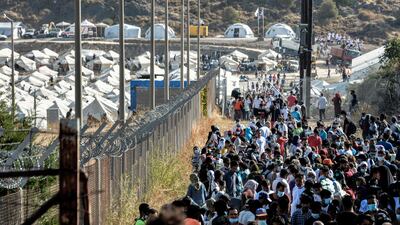EU interior ministers met virtually on Thursday to discuss migration, one of the most divisive issues facing the 27-member bloc.
The video conference hosted by Germany, which holds the presidency of the EU Council, was the first opportunity for members to discuss a scheme proposed by the commission last month.
In a speech setting out her vision for her term as commission president in September, Ursula von der Leyen vowed to reset the EU’s migration policy.
The bloc’s approach to migrant arrivals, which has been routinely criticised by member states and international NGOs, has fuelled the rise of far-right politics across the continent since the 2015 migrant crisis.
The nations are most bitterly divided over where refugees should be hosted with the eastern European nations of Poland and Hungary, which have lurched towards authoritarianism in recent years, most stridently against accepting refugees.

Under the plans proposed by Ms von der Leyen’s commission, proposal the EU would pay a country €10,000 ($11,750) per adult taken in.
EU countries would be obliged to help each other under the new idea of “mandatory solidarity” by either accepting migrants, sponsoring a return to their countries of origin or offering material assistance on the ground in arrival countries.
But if an EU country were under major migration pressure, the commission wants a crisis mechanism to oblige other EU governments to take people in or send them back.
The EU’s reluctant eastern members, the richer northern states where many of the arriving migrants aspire to live and the Mediterranean nations where they mainly arrive have been clashing over where to locate people since the 2015 crisis.
Plans to place a member nation in charge of the return process - if a migrant cannot not be sent back within eight months - is a particular sticking point for Hungary and Poland.

In 2015, more than a million people made it to EU shores, overwhelming security and welfare networks, and stirring far-right sentiment. The EU now receives up to 1.5 million net new foreigners coming legally to live and work per year and only 140,000 asylum seekers arrive illegally.
“Our aim is for Europe to focus on those who need protection, which includes those fleeing the civil war, of course,” German interior minister Horst Seehofer, whose country holds the rotating EU presidency, told reporters.
“But we also want order which means that we won’t in future be letting in so many people who don’t in reality need protection,” he said before the video-conference started.
Germany is keen to reach a deal among EU governments and institutions on the new migration regime by the end of the year, but the process might take longer.
Ylva Johansson, European commissioner for home affairs, told reporters ahead of the meeting that she believed progress could be made on certain points. However, she said the complete deal would likely not be completed until after January 2021, when Portugal assumes the bloc’s rotating presidency.

